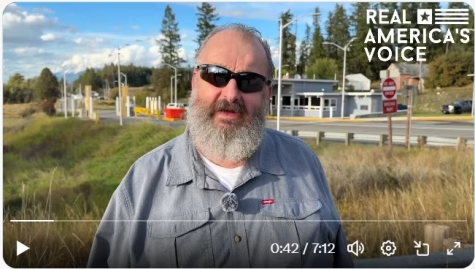“Who’s Going to Pick Our Cotton?”
Idaho Representative Dale Hawkins didn’t mince words. “Who’s going to pick our cotton?” he asked, highlighting a grim truth: even in red states, efforts to curb illegal immigration face fierce opposition—not from voters, but from industries that have grown dependent on cheap, unregulated labor. As Hawkins told Ben Bergquam, host of Law & Border, “We run into a brick wall because their Industries and the AG communities in Dairy communities…we’re subsidizing them because they have these huge amounts of illegals working for them.”
WATCH:
From farms to construction sites, the same story repeats. Workers access schools, hospitals, and jails, costing taxpayers twice over, while industries benefit from labor laws that are, in practice, ignored. “We’re paying for it twice,” Hawkins said bluntly. His solution? Greater accountability and legislative oversight, including audits of refugee camps, public education, and law enforcement resources to track the true cost of illegal labor. But even bills like Idaho House Bill 335 meet stiff resistance. “Lawyers galore came out of the woodwork,” Hawkins recalled, “and it was very sad to see Catholic Charities and other associations…pick at it so much that even good folks on the committee were a little nervous.”
The Northern Border: An Overlooked Gateway
While most Americans focus on the southern border, Idaho’s northern frontier is just as vulnerable. Hawkins described the nearly 6,000-mile border with Canada as “almost completely unmonitored…you simply just walk across.” Winter conditions may slow traffic, but in the summer, lax Canadian enforcement allows potential bad actors—including cartel members and jihadists—to move freely. “Nobody’s paid attention to the Border in the north,” Hawkins warned, emphasizing the national security implications of a neglected frontier.
Targeted Operations and Interior Threats
Bergquam’s second post highlighted operations inside the country, featuring Spokane Border Patrol Chief Jason Liebe. Liebe explained that their teams, working with ICE and other federal agencies, target individuals illegally present with criminal histories or prior deportations. These efforts are not merely administrative—they address internal threats like drug and human trafficking. “The work that we’re doing is critically important to the National Security of the United States,” Liebe said, underscoring the hidden dangers that exist well beyond border lines.
WATCH:
Law enforcement’s efforts are complicated by activists and protesters attempting to shield criminal aliens. Liebe described incidents where agents faced direct opposition during operations, yet continued their work to uphold federal law. Bergquam’s commentary praised their courage: “God Bless Border Patrol! God Bless ICE!” It is a reminder that protecting the nation often comes with both political and personal risk.
The Big Lie and Economic Dependency
The narrative that Americans won’t do the jobs taken by illegal immigrants is, according to Hawkins, a fabrication. Reflecting on his own experience running a landscaping business in Nevada, he called it “the big lie.” Jobs historically performed by Americans are now filled by foreign labor, often under substandard conditions. Hawkins framed it bluntly: “This is modern day slavery…anyone who says ‘who’s going to pick our fruit, who’s gonna build our houses’…that’s slave labor, absolutely.”
This dependency extends into industries like dairies and construction, where compliance with labor laws is often ignored because the economic incentive to maintain cheap labor outweighs legal obligations. Reform is possible, but only if lawmakers and communities confront these entrenched interests head-on.
A National Problem, Not Just a State Issue
Idaho’s struggles reflect a broader reality across the United States: illegal immigration is not merely a border issue—it is an economic, social, and security crisis that affects communities nationwide. From northern border vulnerabilities to interior criminal activity, the risks and costs are widespread. Hawkins’ question—“Who’s going to pick our cotton?”—is emblematic of a larger challenge: whether the country will continue to subsidize a system that relies on exploitation, or take meaningful steps to restore accountability and fairness.
Bergquam’s coverage, highlighting both Hawkins’ legislative battles and Liebe’s operational insights, demonstrates that reform will require more than rhetoric. It will take political courage, community awareness, and a willingness to confront inconvenient truths about labor, legality, and national security. Until then, Americans are left to grapple with the consequences of a system that allows modern-day slavery to persist under the guise of necessity.
